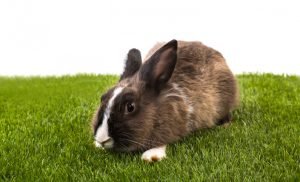Did you know that rabbits are susceptible to a number of health problems? Many of these problems can be prevented with proper care, but it’s important to be aware of them so you can take steps to keep your rabbit healthy. Read on to learn about some common health problems in pet rabbits.
What are the signs of a sick rabbit?
A sick rabbit can be difficult to identify since they do not openly displace symptoms the same way larger mammals, such as cats and dogs, might display. Common signs of illness in rabbits include a decrease or lack of appetite, changes in water intake, frequent diarrhea, blood in urine or stool, difficulty breathing, drooling or paralysis of the legs.
It is important to watch for bunny behavior that is out of the ordinary as well as any issues with grooming. If there are any changes in the appearance of your rabbit’s coat – like matting hair or dirty hindquarters – then it is best to contact a veterinarian immediately. Even minor changes in a rabbit’s habits can point to something more serious and should never be taken lightly.
How to prevent dental problems in rabbits?
Keeping our furry friends healthy and happy is one of our top priorities when it comes to our pets. Caring for your rabbit’s teeth is essential to avoid any dental issues that could result in major medical problems. The two main preventative steps we can take are providing a balanced diet that includes hay, vegetables and plenty of fresh water, as well as brushing their teeth regularly with a small animal toothbrush or gauze wrapped around your finger.
Keeping up with routine check ups by your veterinarian will also help ensure that your rabbit doesn’t develop any dental issues so they can enjoy long and happy lives.
What are the common respiratory infections in rabbits?
Respiratory infections are a common issue with rabbits, and there are a few that stand out among the others. These include Pasteurellosis, which can cause sneezing, coughing and difficulty in breathing; Koi Herpesvirus, which is often fatal; Streptococcus infections, which can cause coughing, nasal discharge and difficulty in breathing; as well as Mycoplasma pulmoise infections, which result in slight fever, sinus congestion and coughing.
In any case of respiratory infection in rabbits, it is important to visit your veterinarian immediately for diagnosis and treatment. This will help to minimize any inflammation or secondary bacterial infection that could result from an untreated respiratory illness.

What to do if your rabbit has diarrhea?
If your rabbit has diarrhea, it is important to act quickly. Start by providing a safe and comfortable environment for your pet. Make sure the area is well ventilated, free from loud noises or other sources of stress.
Offer your rabbit plenty of water and remove any damp bedding from their hutch. You should also talk to your vet about feeding your rabbit a special diet that can help reduce symptoms. For example, adding some raw pumpkin puree blended with water can be a great aid – not only does its fibrous texture help firm up loose stools but it also contains beneficial antioxidants.
Be sure to monitor your rabbit’s health closely if you begin administering natural treatments for diarrhea, as home remedies may not be successful in all cases.
How to deal with hairballs in rabbits?
The most important step to dealing with hairballs in rabbits is providing ample grooming. Regular brushing and combing can greatly reduce the amount of fur your rabbit consumes while they groom themselves, thereby reducing the likelihood of a hairball forming.
In addition, making sure that your rabbit has plenty of hay and fresh vegetables to snack on can also be useful; this will help them keep their digestive system running smoothly and reduce their risk for developing an obstruction. If you think your rabbit may already have a hairball in their stomach, taking them to the vet is recommended for diagnosis and potential treatment.
Finally, keeping your home free from dust and other irritants can also help ensure that any excess fur that your pet produces will not cause more problems down the road.
What are the symptoms of E. cuniculi infection in rabbits?
E. cuniculi infection is a serious health issue for rabbits, as it can lead to potentially fatal organ damage and neurological problems.
Symptoms include difficulty walking or paralysis, head tilt, twitching or tremors of the head and neck, seizures, and behavioural changes such as an increase in circling behaviour. Additionally, this infection can weaken a rabbit’s eye muscles which may cause crossed eyes or unequal pupil size.
It is important to take your rabbit to the vet if you notice any of these symptoms, so your pet can receive proper care and treatment to reduce risk of long-term health issues.



